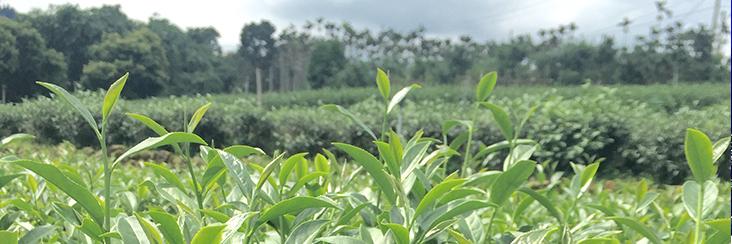
Heirloom Small Leaf Type Black Tea | Eco-Cha Tea Club

Above is a closeup shot of the tea garden that this batch of tea was harvested from in Yonglong Village, Taiwan. It is an heirloom crop of Qing Xin Oolong in the sense that the original trees were planted about 40 years ago and propagated in the traditional manner. This involves binding down some of the branches of an established tea plant and burying the supple new growth branches enough for them to take root. This is the most guaranteed way of preserving the original nature of the plant and preventing mutations that can naturally occur from using cuttings, or especially growing from seed. Since this method is labor intensive and takes much longer, it was phased out by commercial production of tea saplings to establish new plots of tea much more expediently. The purchasing of saplings also has much greater potential of resulting in variations within a given strain, due to the unknown factors of their origins and cultivation methods. The image below shows Phoenix Mountain in the background, looming behind this ridge where Yonglong and Phoenix village are perched above Dong Ding Mountain which comprise the historical origins of Dong Ding Oolong Tea in Taiwan.

As we can see in these photos, this plot of tea is still in a thriving state of health and abundance. The father of this family-run farm attributes this to the fact that he has never used chemical weed killers on his land, and only uses natural fertilizers. This stands in contrast to the majority of farms that were established around the same time and later, which have already been retired or replanted due to the tea trees diminishing in health and productivity. We are happy to say that the new generation of tea farmers has mostly ceased using weed killers, and natural fertilizers have become the norm. This sustainable trend gives us renewed hope in this historical resource, especially since new crops of traditional strains, such as Tieguanyin and Wuyi have only recently been planted. We are inspired by this new growth in one of the most significant traditional tea making regions in Taiwan.

The quality of tea that is made from these heirloom plants sets it apart from the more recent generations of tea farms that have been established. We showed these photos to our friend from a neighboring village who is a 52 year old 4th generation tea farmer, and he instantly recognized the shape and size of the leaves as distinct from more "modern strains" of Qing Xin Oolong. We are confident in saying that the cultivation practices on this farm along with the strain that was planted 40 years ago distinguish it as a rare and valuable resource. We feel honored that this is our ongoing source of traditionally made Dong Ding Oolong. And we are delighted to share a batch of tea that was harvested in June and processed as Black Tea by the young and talented son of this family-run farm — equipped with its own private on-site factory.

This production of Black Tea between late spring and fall is a new trend of tea production in the heart of Oolong Country, using "Small Leaf Type" strains normally used for making Oolong (partially oxidized) Tea. The compounds in the tea leaves grown in warmer seasons are optimally processed as Black Tea. In fact, the renowned historical region of Sun Moon Lake professes that its prime quality seasonal yield is from May to August. This area largely produces "Large Leaf Type" tea, namely Assam and the indigenous wild tea strain, and now most prominently, the hybrid of Assam and Wild Tea known as Red Jade, or Tai Cha #18.
There has been an increasing trend in central Taiwan to use summer harvests of what otherwise is processed as High Mountain Tea or Dong Ding Oolong style tea. These seasonal batches of Small Leaf Type Black Tea have quickly gained popularity on the domestic market. We now feel inspired to represent this trend by introducing the most rare and quality produce of this type. In the last 12 months of seeking out and deciding upon our next monthly Eco-Cha Tea Club batch, we have chosen 3 very distinct batches of Black Tea, all made from Small Leaf Type strains.
We really would love to hear about your experiences of these batches of Black Tea that we've shared in the last year. Go ahead and post your comments on this batch along with your recollections of the previous batches here!

